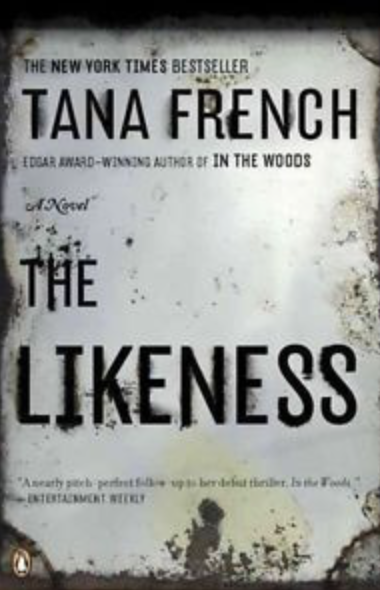SPOILER ALERT THROUGHOUT – SORRY. I did not enjoy this book personally, and although it was thoroughly enjoyed by other members of the Mystery Book Club – all of whom I respect and appreciate – I would not recommend this book to others. Basically, what follows are the reasons I disliked it.

It was hard to get into it in the first 3 chapters (96 pages). Very slow beginning. By chapter 3 I am ranting, “Come on! Get on with it!” Don’t sit around and think, complain, and plan. Let’s get to the investigation!
Tension (suspense) picks up for remainder, however, as Detective Cassie from the Dublin police, the main character, goes undercover. Will her impersonation of Lexie, a young adult living in a cult-like community, be discovered? Will the other 4 members realize that she is not the cult member they lived with for two years? Did one of the 4 actually kill Lexie? The concept is good and the tension is there.
But for me, the suspense is sidelined by several distracting factors about the story:
- The explanations of Cassie’s emotions and the details of the relationships in the community are verbose and become annoyingly boring. I don’t buy the idea that this is a “literary novel” so that gives the author “permission” to write endlessly. You could cut 20% of the book without interfering with the mood, style, plot or charcterizations.
- Cassie conceals information from her handler and superior officer – why? It was dangerous to do that and in fact the case would likely have come to a better conclusion had she been a team-player. So why? It isn’t clear except for a psychologically twisted explanation that she … what? owed this to someone? It isn’t really clear. But it is in her nature. Buy that empty explanation to continue reading. From the point that she failed to tell Frank about the diary until the ultimate stupid move (displaying the hidden mic to Daniel), I grew increasingly impatient with her and –whatever other merits to the book became increasingly harder to appreciate. In conclusion, – no, I did not “like” the lead character at all.
- On top of this — and perhaps the preface would have been a clue — she becomes emotionally/spiritually entangled with the person she is impersonating, and she becomes entangled with the suspects with whom she is living over the few weeks of her undercover operation. Stockholm syndrome? Never mentioned.
But again – the Preface: “Somewhere in the house, faint as a fingernail-flick at the edge of my hearing, there are sounds: a scuffle, whispers. It almost stops my heart. The others aren’t gone, I got it all wrong somehow. They’re only hiding; they’re still here, for ever and ever.” I should have detected the emotion, the almost spiritual or supernatural entanglement of the narrating (unreliable narrator sub-genre) investigator with the “family” of damaged individuals that made up the household. Because, no, they are not there forever. One is dead. The others moved to separate and unsuccessful lives.
And in case one didn’t get it, we have these words from Cassie, the narrator, as the book ends: “After that I hoped I’d dream about Lexie, just every now and then. She’s fading from the others’ minds, day by day; soon she’ll be gone for good, she’ll be only bluebells and a hawthorn tree, in a ruined cottage where no one goes. I figured I owed her my dreams. But she never came. Whatever it was that she wanted from me, I must have brought it to her, somewhere along the way.” I absolutely am unable to relate to superstitious nonsense like that. No, I do not find this to be sad, emotional, evocative, or psychologically insightful. “I figured I owed her my dreams…” These are the words of a drunk person or a fool. I like my central characters, though flawed, to be rational enough to do their job if they are detectives. She should be fired, but it doesn’t look like that will happen.
Just to be clear, with the central characters of other authors, like Connelly’s Bosch, we also have a flawed person who at times does stupid stuff. At times he does not follow protocol like calling for backup. But when you are responding to a life-threatening situation, there are understandable reasons. In Bosch’s case, his generally rational approach and “code” outweigh occasional lapses. He is not mentally unstable; Cassie is. - There is no real resolution to who stabbed Lexie, the original victim that triggered the case. Daniel claims to have done it before he does suicide-by-cop. But there is every reason to think he is covering for someone else. Many readers have speculated that he was covering for Justin. My guess is he was covering for Abby. Abby was the member most dedicated to the community idea (apart from Daniel) and most dedicated to Daniel. She loved him. She is thus the one who would most likely have responded in rage to see Lexie destroy their dreams when she learns that Lexie has “sold out” to the obnoxious investor, Daniel’s cousin. I am, as you can observe, not a fan of loose ends or unresolved plots.
On Goodreads, French gives us an insight into her thinking about the convention of making the ending or resolution of a book clear. She was asked about her first book, “Are you ever going to find out what happened In The Woods?” There are two crimes in the book, one happening long ago. A lot of the past is revealed, but the perpetrator is not revealed. The story is told in the first person – the narrator being Rob, the troubled detective. French explains:
So when it came to the ending of In the Woods, I had three choices:
1 – Turn the narrator into a totally different character at the end of the book, for the sake of a neat plot resolution: shoddy and dishonest.
2 – Have some other character do a deus ex machina and find out for him: forced and cheap.
3 – Complete the arc of his psychological journey (which for me was the core plot arc of the book) and the arc of the modern-day mystery, but leave the old one unsolved.
I went with the third one – because that was the one that was true to the character and the rest of the book, and because I always saw In the Woods as a book about Rob and what that old mystery resurfacing does to him, rather than a book about the mystery itself. I knew some readers would be furious that it didn’t stick to the conventions of the mystery genre, and I could see why – but on the other hand, I also knew some readers would be furious if I sold out my narrator in the last chapter for easy closure. I figured all I could do was write the best book I was capable of writing, and hope it was good enough. [BOLD added by the writer of this blogpost.]
This is a long-winded way of saying that, at the moment, I can’t see any way I’d be able to resolve that mystery – again, the answer is in Rob’s head, and his nature means that he’ll never have the courage to take that leap and find it.
Obviously, I am one of those furious that she didn’t stick to the convention in The Likeness. Earlier in the book (around page 78), Cassie explains what she thinks her job is with respect to the victims of homicide:
I used to believe, bless my naive little heart, that I had something to offer the robbed dead. Not revenge—there’s no revenge in the world that could return the tiniest fraction of what they’ve lost—and not justice, whatever that means, but the one thing left to give them: the truth. I was good at it. I had one, at least, of the things that make a great detective: the instinct for truth, the inner magnet whose pull tells you beyond any doubt what’s dross, what’s alloy and what’s the pure, uncut metal.
I think there were many opportunities for that to happen in this book, for the truth of who actually stabbed Lexie to come out, and it could have been done in such a way that would not change the psychological picture created for each of the people involved. The author simply chose not to do that.
Interestingly, under the author’s page on Goodreads, French is asked: “Your characters are so well developed that they remain in my head and heart long after I have closed the book. I am curious as to which character has lingered with you the longest and why?” And French replies:
Oh, interesting one. I’d never thought about this till I read your question – but I think it’s Lexie Madison, the murder victim from The Likeness. She’s the one who remains most a mystery, to the narrator and to me, and so she’s stayed in my mind most vividly.
I guess that’s another way of saying, she likes leaving loose ends.
So all of these things distracted from my buying into the story’s “frame” – the idea of a look-alike, the disappointment of the detectives poor professional behavior, the idea that you could impersonate a look-alike, the long-drawn out build-up through descriptions of the psychological make up of the cult-like family.
No, I will not read another Tana French novel.
In another blog post, I speculate further about The Likeness.
A copy of my Kindle Notes while reading The Likeness can be seen by clicking here.


